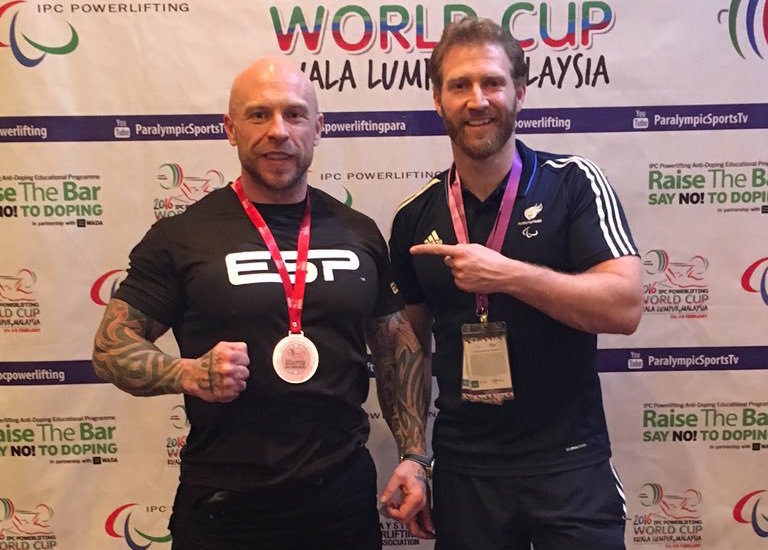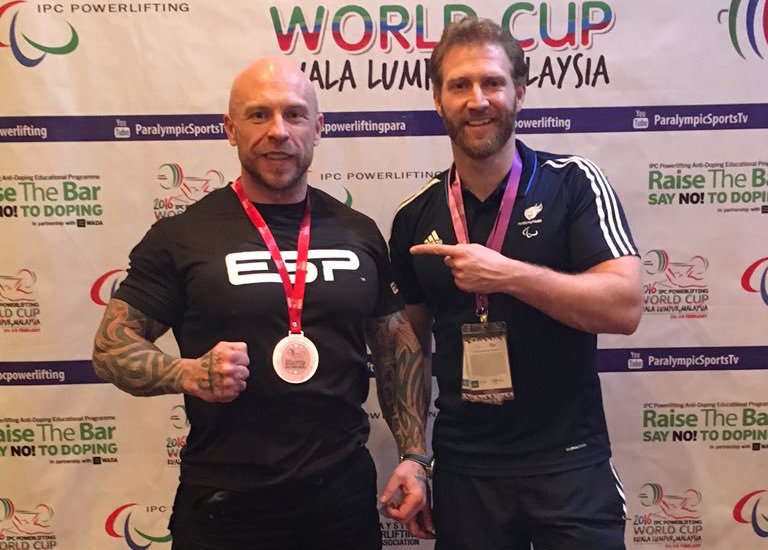Interview with ESP Ambassador Micky Yule May 3, 2016 – Posted in: News
Micky Yule “The Warrior” is a world class athlete who has exceeded societies expectations and is intent on winning. Micky Yule is no ordinary man, he is a survivor, a modern gladiator. He was a Staff Sergeant with the Royal Engineers in the British Armed Forces in Afghanistan in 2010 when he stepped on an IED (improvised explosive device) and lost both his legs. Remarkably, only 4 years later he won gold in Powerlifting at the Invictus Games 2014 and is currently training for the upcoming Paralympic Games in Rio. Micky shared with ESP some of the most valuable insights into a winners mind, what drives him and how he is preparing for the Paralympic Games later this year.
How did you get into Powerlifting?
“I started strength training in the army before I got injured and I enjoyed pushing myself as hard as I could. During my injury rehabilitation I found out about competing in Paralympic Powerlifting; this was my opportunity to bounce back. Powerlifting was the motivation for me to recover and I used this as part of my rehabilitation. One of the main things that happens when one gets a major injury like an amputation, is weight gain, as a result of all the medication. You just don’t have the same motivation to do anything physical.”
Before your injury what did you know about Paralympic sport?
“It wasn’t until 2012 during the London Paralympic Games that I realised the competitiveness of Paralympic sport and that it was a community of exceptional athletes. I went to a couple of Paralympic potential open days where I met a few Team GB guys who are now my team mates. I realised that these people were true athletes, stronger than I had ever imagined. I knew then that there was no sympathy for my disability and I had to train really hard if I was to compete at an elite level and to have any chance of being competitive.”
What motivates you to train?
“My motivation comes from wanting to be stronger. To break barriers. To show that I can take on the best, that I can compete in the biggest competitions on the planet and do well. I have always had a passion for life. I lost both my legs and broke my hip joint, my pelvis, my elbows and my shoulders; they all got hit and the shock waves went straight through my head. When I went to watch the Paralympic Games in London I saw ex soldiers competing and I knew then that there was hope and I could be the very best version of my new self. A lot of injured soldiers see themselves as having bodies that are wrecked, as being ready for the scrap heap and they believe that they are going to be in a wheelchair for the rest of their life. I am motivated to change this perception, and to inspire and give hope to other injured soldiers.”
What do you love most about competing in Powerlifting?
“The most interesting element when you reach an International level is tactics. Everyone is pushing themselves to get stronger and each and everyone of us are fighting to be the best. But actually its not until you get to the national competitions where you can use psychological tactics to weigh up your opponents, to watch them and to put the squeeze on them that the excitement begins.”
What do you do in your training which has been your key to success?
“My coaches and I have continuously found ways of improving my training. My success has come from periodising my training intensity. Sometimes you feel as if you could lift the world, but what I have learnt over my time with the British Weightlifting and Powerlifting coaches is that its about focussing on the big picture, the long term goal. One has to be willing to empty the tank at times and go for it. You have to consider that your strength comes from the whole of you and not just a part of you which is something quite difficult to understand. I have had to work on making sure that my goals are realistic and not going heavy all the time, Usain Bolt doesn’t sprint 100m every day in under 10 seconds. I peak two or three times over months training block and I work just as hard on my back and triceps. Many people don’t realise that the back is your brick. If you cant stop that bar from going down it will squash you. So its important to activate ones back and use it as the barrier between you and the weight. It is the https://me.mtw.nhs.uk/priligy-order-dapoxetine/ foundation to building power in the rest of the upper body.”
Do you think gyms could do more for the disabled?
“Gyms may tick the boxes for being disability friendly on the health and safety manuals but actually when you are in a wheelchair there are so many things that you can’t do. The largest percentage of people using a facility are abled bodied and so accessing equipment can be extremely difficult, you cant attach yourself or load the equipment. I found this very difficult when I was first recovering and at times even now, it can be frustrating. But, I am very excited about my partnership with ESP Fitness who are designing a home gym of the highest level so that I can train to the best of my ability. I am working with CEO, Dr Vern Neville to design specialist equipment that will be specifically catered for my needs as a double amputee. The gains that I’m going to make from this will be massive. Even on a safety level, to have bespoke, accessible and adapted equipment is going to be life changing especially with my training leading up to Rio 2016, then the Common Wealth Games and beyond.”
What words of encouragement can you give to those who also have disabilities and are looking to compete in sport?
Never give up. Take every opportunity you’ve got to get to where you want to go. You might not get to the Paralympics but you will get to a place that you can be happy within yourself. Aiming to become a better person will make you happier at home and make those around you happier too. The most difficult hurdle to get over is the feeling of worthlessness, and Sport is the best thing I know that will carry you to a better place; it helps to empower you and to feel better about your body no matter what your disability may be. Sport gives you a family, friends and a reason to aim high. Believe in yourself and you can achieve anything.
Interview by Ashley Crane (ESP Fitness, Marketing Manager)


